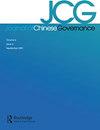What does sustainability demand? An institutionalist analysis with applications to China
IF 3.7
3区 社会学
Q1 POLITICAL SCIENCE
引用次数: 20
Abstract
Abstract In this paper we discuss if existing political and economic institutions can ensure sustainable futures. We do so by combining a global outlook with more specifically examining the situation in China. Present institutions foster growth, they are however weak at motivating actions that keep economies within an environmentally safe and socially just space. We especially note the challenges that strong focus on growth combined with ex post environmental regulations create for natural systems with tipping-points. In this situation, there is a need to change institutions to ensure strong emphasis on long-term sustainability as opposed to short term economic surplus. Regarding political decision-making, we discuss ways to break short-termism through strengthening public deliberation as well as formalizing political responsibility for the future. Regarding economic institutions, we emphasize the need to widen the goals of firms including responsibilities for environmental qualities. The latter may demand changes in ownership structures.可持续发展需要什么?制度主义分析及其在中国的应用
摘要本文讨论了现有的政治和经济制度能否确保可持续的未来。为此,我们将全球展望与更具体地考察中国的情况相结合。目前的制度促进增长,但它们在激励采取行动使经济保持在环境安全和社会公正的空间方面很薄弱。我们特别注意到,对增长的强烈关注与过去的环境法规相结合,给具有临界点的自然系统带来了挑战。在这种情况下,有必要改变制度,以确保大力强调长期可持续性,而不是短期经济盈余。在政治决策方面,我们讨论了如何通过加强公众审议以及对未来的政治责任正规化来打破短期主义。关于经济机构,我们强调需要扩大企业的目标,包括环境质量的责任。后者可能要求改变所有权结构。
本文章由计算机程序翻译,如有差异,请以英文原文为准。
求助全文
约1分钟内获得全文
求助全文

 求助内容:
求助内容: 应助结果提醒方式:
应助结果提醒方式:


